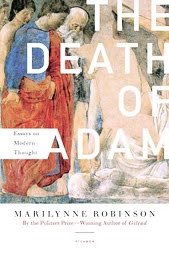
Marilynne Robinson won the Pulitzer Prize this year for her novel
Gilead. Her prose is beautiful, measured, and full of great theology. The novel is centered around a 70 year old preacher who is writing a memoir for the benefit of his young son. He reflects on his life--mistakes he has made, and what time has taught him about the glory and ruin of the human condition. John Calvin shows up a lot, which made me wonder about Robinson's own theology.
So I was excited to hear recently that pre-Gilead, post-Housekeeping she had written a series of essays on, who else, John Calvin (she refers to him by the French Jean Cauvin), in which she defends him against the bashing of modern critics like Max Weber (The Protestant Ethic and the Spirit of Capitalism) and Perry Miller (The New England Mind), both famous for originating the now widely accepted belief that Calvinism and Puritanism were (and are) bleak, joy-killing, repressive movements. For her full take, read the book, but here's a sampling of her thoughts, here on the false association of the Calvinist doctrine of election with "elitism":
While Calvinists spoke of an elect, Leninists and suchlike have spoken of an elite. The two words come from the same root and mean the same thing. Their elect [Calvinists'] were unknowable, chosen by God in a manner assumed to be consistent with his tendency to scorn the hierarchies and overturn the judgments of this world. Our elites [American society] are simply, one way or another, advantaged. Those of us who have shared advantage know how little it assures, or that it assures nothing, or that it is a positive threat to one's moral soundness, attended as it is with so many encouragements to complacency and insensitivity...The American salvation myth and the Stalinist salvation myth have in common the idea that the great body of the culture is a vast repository of destructive notions and impulses, that certain people rise out of the mass in the process of understanding and rejecting all that is retrograde, and that, for those people, there is never any use for, nor even any possibility of, conversation on equal terms with those who remain behind. The history of elites is brutal and terrible.
Note: One theological side note worth mentioning: While it is true that in one sense we cannot "know" who is elect and who is not (since we don't have the Lamb's book of life open in front of us), Scripture is clear about who the elect are: they are those who sense their unworthiness before God and call upon the name of Christ. That is the only ground of assurance for Christians. In this sense, the biblical doctrine of election is quite the opposite to elitism--it should properly produce humility rather than pride.
Relating this to how we treat our unbelieving friends (or our believing friends who we think don't "get it"), think about the cruel and harsh words and tones we often use in speaking about individuals or groups of people who, in Robinson's words, "remain behind." If the world is ever going to be convinced that God's elect are not "elite," we must take heed of not only what we are saying but how we are saying it. More importantly, we must examine our hearts for elitist attitudes and begin to repent of them.













